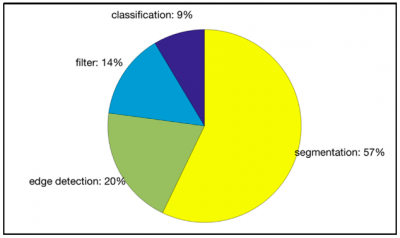Food for Thought | Fuzzy Logic in Medicine
Overview
Uncertainty is inherent in the field of medicine and bioinformatics. There are a lot of “fuzzy areas”; there may be little information (or mistaken information) about the patient, lab results can be wrong, family medical history can be imprecise, etc. Humans are also facing an increasing number of mental disorders and no structured classification. A single disease, e.g. COVID-19, can affect different patients with different intensities, depending on the geographic and demographic characteristics.
Since fuzzy logic plays with uncertainty, it appears to be an ideal way to deal with many of the shortcomings found in medical information.
Providing explicit descriptions of medical concepts and the relationship between concepts is very difficult. In quite a lot of cases, the partitions are fuzzy. Human thinking and decision-making are fuzzy, with a high degree of vagueness in proof and concept application. There is a high level of vagueness in many statements, e.g. “if an elderly person has severe headache, acupuncture therapy is administered for some time”. This statement consists of vague terminologies: “elderly”, “severe”,” some”. For these kinds of fuzzy statements to be deciphered, the use of soft computing (SC) methodologies is advised.
Fuzzy Logic in Medicine
According to the World Health Organization (WHO):
“Health is a state of complete physical, mental and social well-being and not merely the absence of disease or infirmity.” [1]
The loss of health can be seen in three forms: disease, illness, and sickness.
We can paraphrase the explanation given by Torres and Nieto in their paper, Fuzzy Logic in Medicine and Bioinformatics:
‘According to Aristotelian logic, there are only two logical values: true or false, black or white, etc. In real life, most things are not simply black or white; there are many shades of grey in between. Fuzzy logic accommodates these “partial” values, for example, between absolutely true and absolutely false.’ [2]
In health as in other things, there is a range of conditions. A person without any disease can have a headache or a stomachache; does this mean they are no longer healthy? Or do we measure health only in terms of serious conditions, e.g. “A has heart disease, so A is not healthy; B does not have heart disease, so B is healthy”? Paraphrasing the paper Evaluation of the Risk of Drug Addiction with the Help of Fuzzy Sets:
‘Everybody is healthy to some degree and sick to some degree … If someone only has a headache, we may say they are 99% healthy and 1% sick. … Uncertainty is an indispensable part [of science], and fuzzy logic is a way to represent and deal with [such uncertainty].’
How Can Fuzzy Logic Improve Medical Information?
Fuzzy logic is currently being explored for many bioinformatics and medical applications. For example, it could be used in the diagnosis of different diseases, such as tuberculosis, cancer, diabetes, heart disease, HIV, and others.

Fuzzy Image Processing Applications Applications
In addition to the ongoing implementation, there are several areas where implementation could soon begin, such as diagnosing malaria and prostate disease, dealing with hepatobiliary disorder, and differentiating between various syndromes.
There are continuous efforts to improve image processing techniques using fuzzy logic to support medical decision-making. Examples of FL-supported applications are:
- Radiographic image classification
- Identifying edges
- Image segmentation for tumors
- Motion detection
Future work will also focus on the application of fuzzy artificial networks in medicine, evaluating parameters such as accuracy, sensitivity, and specificity.
Sources
[1] World Health Organization, “What is the WHO definition of health?”
https://www.who.int/about/who-we-are/frequently-asked-questions
[2] Torres, Angela and Nieto, Juan J., “Fuzzy Logic in Medicine and Bioinformatics”
https://www.ncbi.nlm.nih.gov/pmc/articles/PMC1559939/
[3] Singh et al., “Evaluation of the risk of drug addiction with the help of fuzzy sets”
http://citeseerx.ist.psu.edu/viewdoc/download?doi=10.1.1.886.48&rep=rep1&type=pdf
Additional References
- Healthcare, Uncertainty, and Fuzzy Logic
- Medical Applications on Fuzzy Logic Inference System: A Review
Technical articles are published from the Absolutdata Labs group, and hail from The Absolutdata Data Science Center of Excellence. These articles also appear in BrainWave, Absolutdata’s quarterly data science digest.























